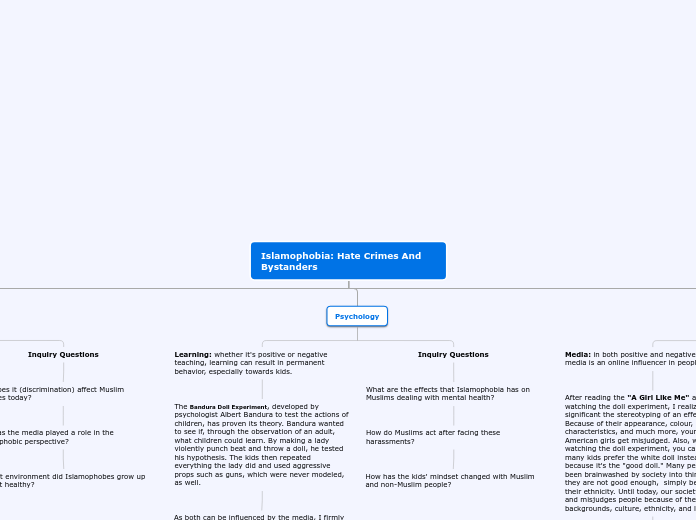Islamophobia: Hate Crimes And Bystanders
Anthropology
Geographical Location: it is the study of the various cultural viewpoints found globally and how they relate to the spaces and locations where they originate and then travel.
The Attawapiskat House Crisis has led to the forcing of numerous families to live in tents and trailers because they do not have a safe home in which to live. Although federal officials claimed to be unaware of this situation, they have traveled to Attawapiskat at least ten times in one year.
This background research relates to the article on Islamophobia in a way. No one had said anything when Sundus got verbally harassed on the city bus for wearing a hijab. People were behaving cluelessly. Similar to the people of Attawapiskat, with the house crisis. It had negatively affected them by having to live in tents and trailers, which is not being taken seriously by the federal officials.
Inquiry Questions
How does it (discrimination) affect Muslim societies today?
How has the media played a role in the Islamophobic perspective?
In what environment did Islamophobes grow up in? Is it healthy?
Psychology
Learning: whether it's positive or negative teaching, learning can result in permanent behavior, especially towards kids.
The Bandura Doll Experiment, developed by psychologist Albert Bandura to test the actions of children, has proven its theory. Bandura wanted to see if, through the observation of an adult, what children could learn. By making a lady violently punch beat and throw a doll, he tested his hypothesis. The kids then repeated everything the lady did and used aggressive props such as guns, which were never modeled, as well.
As both can be influenced by the media, I firmly believe that both the article and experiment are related. While watching the Bandura Bobo Doll Experiment, it appears that children copy what they see, along with the media and cartoons. This relates to the article on Islamophobia, as the media can be affected by discrimination. People appear to believe what they see and hear, which, like Islamophobia, can cause problems in the world.
Inquiry Questions
What are the effects that Islamophobia has on Muslims dealing with mental health?
How do Muslims act after facing these harassments?
How has the kids' mindset changed with Muslim and non-Muslim people?
Sociology
Media: in both positive and negative ways, the media is an online influencer in people's lives.
After reading the "A Girl Like Me" article and watching the doll experiment, I realized how significant the stereotyping of an effect is. Because of their appearance, colour, characteristics, and much more, young African-American girls get misjudged. Also, while watching the doll experiment, you can see that many kids prefer the white doll instead of black because it's the "good doll." Many people have been brainwashed by society into thinking that they are not good enough, simply because of their ethnicity. Until today, our society prejudices and misjudges people because of their backgrounds, culture, ethnicity, and likewise.
"A Girl Like Me" and the study on Islamophobia are both closely linked to each other. Both kinds of articles are focused on the influence and stereotypes of the media. A significant proportion of Islamophobia is influenced by our social media, which is used regularly. Also, all perspectives are informed by the views of people, resulting in world issues and insecurities.
Inquiry Questions
How does Islamophobia affect Muslims with their job opportunities?
How does it affect their relations with non-Islamic people?
How does the fear of Islam affect Muslim parents with raising their children in a foreign country?
